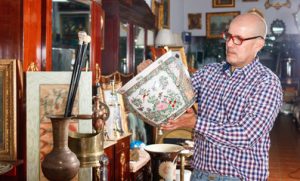Antichità Milano are artefacts or relics that come from ancient times. They can be items of cultural significance, such as a Roman marble sculpture or medieval manuscript.

Buying antiques and ancient art is one of the oldest and most intriguing human hobbies. It can be a rewarding experience, but you should always be careful when purchasing an item.
Antiquities are ancient objects, artefacts and structures that have survived over time. They are the remnants of our shared cultural heritage that predate modern religions, nations and devisive boundaries of self-identification. Although they may be venerated as works of art or fashion statements today, the vast majority of them were created for utilitarian or ritual purposes and survive mainly because they have been preserved in the ground. These structures and formations include burial, worship and sacrifice sites and fortifications. They also include relics related to daily life such as pitfalls, cultivation clearings and tar-burning pits. The preservation of these relics depends on their excavation context and, until the advent of archaeological methods in the 20th Century, few antiquarians or museums paid attention to the excavations of their finds.
Terry Barnhart’s book American Antiquities traces the “organic and altogether untidy process” by which antiquarian interest in Indian mounds, speculation about their non-Indian origins and a growing infrastructure for sharing archaeological information yoked westward expansion with a professional discipline that struggled to escape the burden of its own past. He intersperses reports of surveys and theories with diaries, correspondence and other archival materials to give readers a treasury of period discourse.
Thompson’s stories are fabulous, ranging back to Pygmalion and his statue-love, forward to the eighteenth-century British Grand Tourists and their twentieth-century American heirs through figures such as J. Paul Getty. Despite their guile, however, these tales reveal the political stakes in valuing some antiquities and some narratives of civilization more than others, and the role that Western powers have sometimes played in making certain parts of the world less safe for them. As a result, discussions of antiquities’ possession must grapple with the question of how and why some cultures are deemed worthy of them, rather than simply asserting that encyclopedic museums should have exclusive rights over them.
Types
Antiquities can be found in a variety of places, from garage sales to resort towns. Collectors often seek out items that are of unique quality or rarity. They may also be interested in historical significance or cultural value. Some antiques have practical uses, such as furniture, while others are decorative pieces that add a touch of history to a room.
Unlike modern-made goods, antiques tend to increase in value over time. They are prized for their craftsmanship and can be a great investment. Many antiques display signs of wear and age, a patina, which increases their value. This is especially true of items made from precious metals and wood. In addition, many antiques are marked with a seal or chop, which indicates the name of a previous owner.
While much media attention is given to rare artifacts such as Tutankhamun’s tomb treasures and the Parthenon Marbles, most museums are filled with countless objects from the daily lives of ancient people. These objects can be more valuable than works of art, because they are evidence of our common cultural heritage. These objects have survived through centuries of wars, changing political climates and devisive religious beliefs.
Antiques can be purchased at auction, in shops and online. It is important to do your homework and know what to look for. For example, if you are buying a piece of furniture, it is best to avoid pieces with heavy restoration or missing parts. A good dealer will be honest and tell you about the condition of an item. He or she will also be able to provide provenance, which is the documented history of an item. This is essential for ensuring that an antique is authentic.
Authenticity
As art historians, antique dealers and collectors are aware, authenticity is critical to the value of a piece. Authenticity can be determined by the item’s condition, provenance, and history. It can also be confirmed by the quality of restoration and whether it is done in adherence with traditional techniques. It is also important to take into account the age of the object, as this can significantly affect its value.
Antiquities are often smuggled or illegally excavated from archaeological sites, which can have devastating consequences for our understanding of ancient cultures and history. As a result, many museums and collectors have strict policies against buying or displaying items that have been sourced from illegal excavations or forgeries. This is a significant challenge for the art trade, which needs to prioritize cultural heritage preservation over financial gain.
A good way to ensure an antique’s authenticity is to compare it with other similar examples. This can help identify inconsistencies that may indicate a forgery or fake. For example, if an object is heavily patinated, it may have been artificially aged with chemicals or may have had parts replaced. In these cases, the discerning collector should seek a second opinion from another expert.
One of the most effective ways to authenticate an antique is to look for a maker’s mark. Authenticity can be determined by examining the shape and location of the mark, as well as its style. However, forgeries often use these markings as a sign of authenticity, so it is important to look at other indicators of an antique’s authenticity. For instance, a double-spouted jar from the Calima Ilama culture of ancient Colombia was found to have had pieces added later on.
Due diligence
Due diligence is the level of care that a person should take before engaging in an important business transaction. The term originated in the fourteenth century as a legal term meaning “the requisite effort.” It has since evolved into the broader meaning of any research that an individual should do before undertaking a significant financial endeavor, such as purchasing a home or investing in a new company. It is a common practice for businesses to perform due diligence before making an investment, but it is also necessary for art dealers to do so when dealing in ancient objects.
A dealer’s due diligence is a series of checks that they must undertake to ensure that an object is not faked or stolen. This usually includes researching the object’s provenance and consulting other experts in the field. In addition, it is best practice for a dealer to check the item against online databases of looted and illegally trafficked art. This is particularly important for items from countries that are prone to art theft and illicit trade, such as Syria.
Museums that fail to do their due diligence can run the risk of legal action and reputational damage. In addition, flaws in their process can lead to a loss of funding and support for the museums themselves.
Effective loss prevention is key to preserving humanity’s cultural heritage. This can be achieved through better coordination between the countries of origin, transit and destination and through enhancing bilateral frameworks that incentivize and expedite repatriation processes. It is also important for museums to maintain high standards of due diligence when adding antiquities to their collections, especially those from countries with a history of widespread or highly publicized archaeological site looting.
London dealers
Antiques dealers in London are a diverse lot, ranging from traditional furniture sellers to art and antiquities specialists. They often display an incredible geographical diversity – you could be looking at a Celtic brooch next to a Tang Dynasty statue within the same shop window. These antiques dealers are also incredibly forward thinking, constantly updating codes of practice and collaborating with authorities to protect and preserve cultural heritage.
Despite the changes of the last few years, many dealers are still in business, and the great city of London has no shortage of antique shops for enthusiasts to visit. There are numerous specialized dealers, some with large showrooms and others who operate from first floor premises in buildings that are otherwise home to restaurants or boutiques.
A number of the most renowned antique dealers are located on Kensington Church Street. Here, you’ll find a wide range of pieces that would look at home in stately homes and museums, including antique English furniture from dealers such as Eddy Bardawil, Simon Spero, Reindeer Antiques, Brian Rolleston, and the like.
Other famous antique dealers include the Kallos Gallery, a family run business that specializes in ancient Greek and Roman sculpture. Their pieces are sourced from around the world, with rigorous provenance checks. They also invest heavily in education, hosting lectures and publishing research to promote the wider appreciation of ancient culture.
